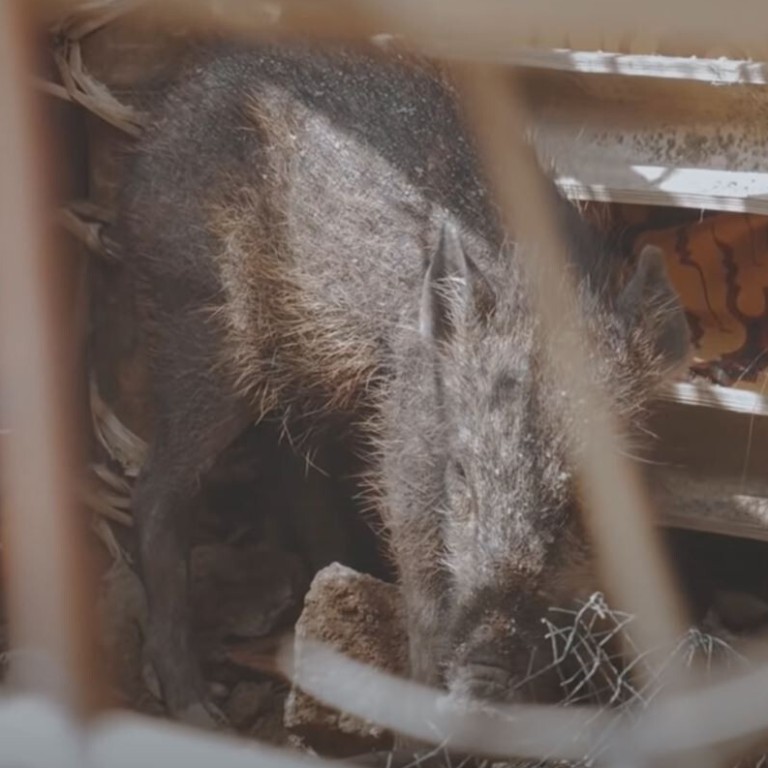
Indonesia’s supernatural shape-shifting boar demons – and why a village beheaded a wild pig
- Superstitious belief in the ‘babi ngepet’ is still widespread in the world’s most populous Muslim nation, especially on the island of Java
- Footage showing the supposed slaughter of one of these pig demon went viral recently. The man behind the hoax could now be jailed for 10 years
Superstitious beliefs are still common in the world’s most populous Muslim nation, where nearly 90 per cent of the 270 million population practises Islam and consider pigs unclean – with consumption of their meat haram (forbidden).
In the viral video, which has racked up more than 1.8 million views since it was first shared on April 28, a man later identified by the police as Adam Ibrahim can be seen telling a crowd of onlookers in Bedahan village how he and a group of others had caught the babi ngepet – but not before they all stripped naked, because it “could only be seen by naked people”.
He said the wild boar was a black magic user who had transformed his or her appearance to steal from others, and demanded that the person’s family come forward to answer for the beast’s “crimes”.
When, about a week later, no one had, Ibrahim cut the animal’s head off and buried it separate from its body – both to stop the two body parts magically fusing back together, and because the pig was purportedly shrinking and would soon “vanish”.
Days later, Ibrahim was arrested for spreading lies and reportedly confessed to police that he had actually bought the boar for 900,000 rupiah (US$62) plus delivery. The community leader, who said he had intended for the pig to act something like a scapegoat for the village’s recent misfortunes, could now face up to 10 years in prison.
WEREBOARS
Similar to the werewolf of Western folklore, a babi ngepet in Indonesian mythology is said to be a person who has been physically transformed – though instead of a scratch, bite or curse, the change is brought about through a black-magic ritual in which the subject voluntarily surrenders their humanity for a period of time in order to get rich quick.
Indonesia bans paranormal activity as shamans clash in search for missing kids
Yono Usu, a 56-year-old from a village in South Lamongan, East Java, recalled hearing about the ritual in the 1970s, when he was still a young child.
“The person lies down somewhere, usually in a very dark place, and someone else holds a lamp with very little light so that no one can see it,” the traditional Javanese theatre artist told This Week In Asia. “With the help of a shaman, the person … becomes unconscious, then somehow – mystically – a wild boar will appear”.
Rather than it being the person who is transformed, Yono said his understanding was that the babi ngepet – which can only be seen by certain people with special abilities – was summoned to act as the person’s “representative” and would steal on command.
“If the boar is beaten until it is lame, then the person who is laid down will also be lame,” Yono said. Killing the boar would likewise kill the person, he added.

00:49
Wild boar romps through staff cafeteria in eastern China
Because belief in the mythological beast is so widespread “even today” on Indonesia’s Java island, Yono said it opened the door for anyone interested in “taking advantage of the beliefs of the people who still believe in babi ngepet”.
Irwansyah, a religious-studies lecturer at the State Islamic University of North Sumatra’s Faculty of Social Sciences, said such beliefs were outside the teachings of Islam – but he said the fact that the babi ngepet is shown on Indonesian television showed “ the culture of a society that believes in mysticism”.
“Muhammadiyah is very strict in its teachings, which [say it] is not allowed to come to shamans or make friends with jinn (supernatural creatures),” he said, referring to one of the largest Islamic doctrines in Indonesia.
Exorcisms, ‘corrective’ rape: inside Indonesia’s LGBT ‘conversion’ therapies
In other parts of the country, such as Aceh province – the only region in Indonesia to impose Islamic law – boars are considered more of a pest than a possible supernatural being, according to Istafan Najmi of the Leuser Conservation Forum.
“In the forest, it is the tiger‘s food. For the community it is a pest because it often damages people’s fields,” he said. “People here don‘t believe in babi ngepet. [Boars] here are considered a pest animal. Usually, when seen, they are immediately kicked out.”

